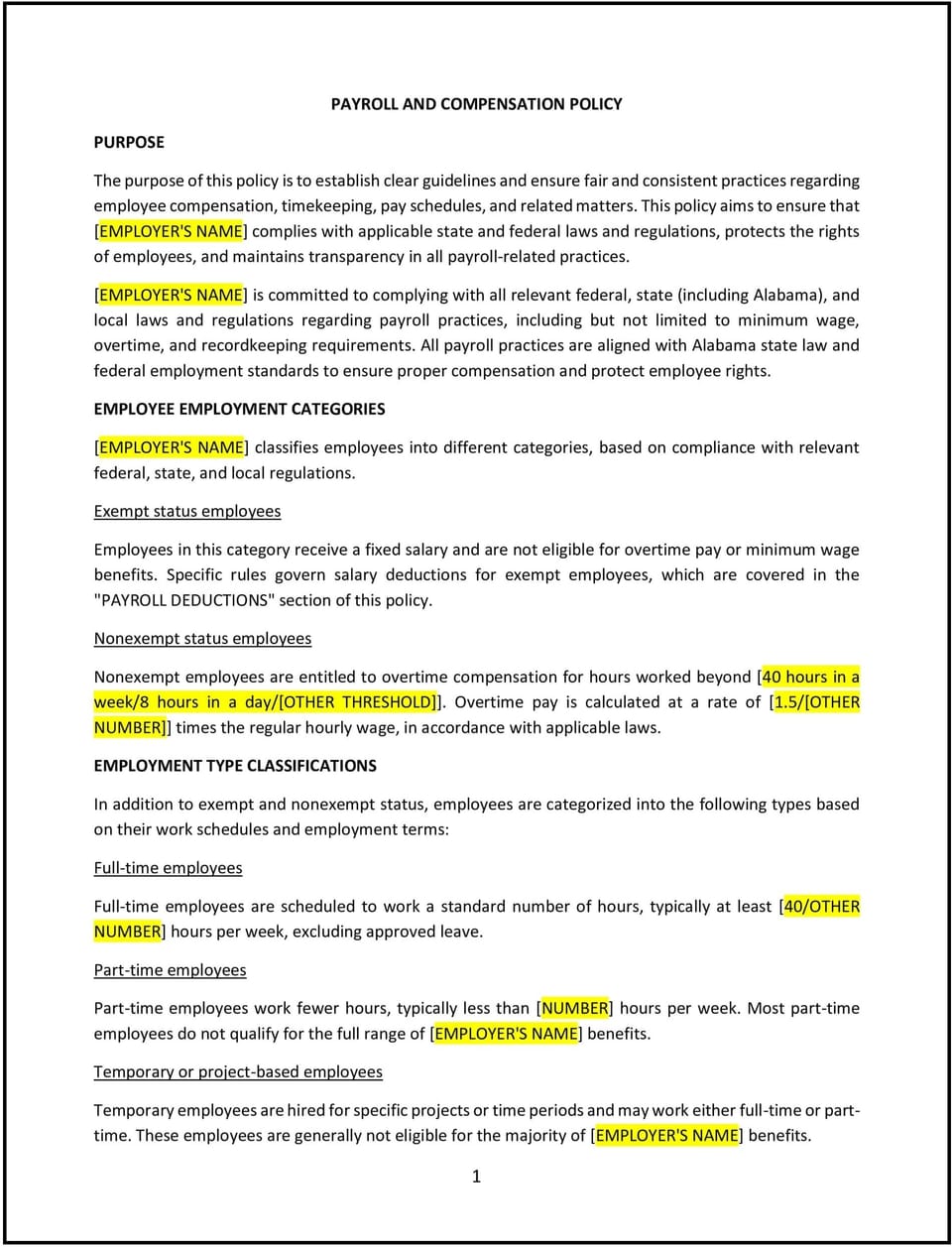Payroll and compensation policy (Alabama): Free template

Payroll and compensation policy (Alabama)
A payroll and compensation policy provides employees with clear guidelines on payment schedules, wage calculations, and adjustments, ensuring transparency and compliance with federal and Alabama-specific labor laws. For SMBs in Alabama, this policy helps streamline payroll operations, fosters trust, and minimizes potential misunderstandings regarding compensation.
This policy outlines payment procedures, deductions, overtime calculations, and dispute resolution processes, creating a reliable framework for managing employee compensation.
How to use this payroll and compensation policy (Alabama)
- Define pay periods: Specify the frequency of payments, such as weekly, biweekly, or monthly, and the corresponding paydays.
- Clarify wage types: Differentiate between hourly wages, salaries, commission-based pay, and any other applicable compensation structures.
- Address overtime pay: Outline how overtime is calculated and paid in compliance with Alabama and federal regulations, such as the Fair Labor Standards Act (FLSA).
- Include deductions: Provide a list of permissible deductions, such as taxes, benefits contributions, or garnishments, and explain how they are reflected in pay statements.
- Establish dispute resolution: Include steps for employees to report and resolve payroll discrepancies or concerns promptly.
Benefits of using a payroll and compensation policy (Alabama)
A well-defined payroll and compensation policy benefits employees and employers by fostering clarity and trust. Here’s how it helps:
- Ensures compliance: Aligns payroll practices with state and federal labor laws, minimizing legal risks.
- Promotes transparency: Clearly communicates payment schedules and calculations, reducing misunderstandings.
- Enhances employee satisfaction: Provides employees with confidence in the accuracy and fairness of their compensation.
- Improves payroll efficiency: Streamlines processes for calculating and distributing wages, reducing errors and administrative burdens.
- Protects the business: Establishes consistent procedures for handling disputes and adjustments, minimizing conflicts.
Tips for implementing a payroll and compensation policy (Alabama)
- Train payroll staff: Ensure HR and payroll personnel are well-versed in Alabama labor laws and FLSA requirements.
- Use payroll software: Invest in reliable payroll management tools to automate calculations, tax withholdings, and reporting.
- Communicate changes: Notify employees of any updates to payment schedules, wage structures, or deductions promptly and clearly.
- Conduct audits: Regularly review payroll records to identify and correct discrepancies or non-compliance issues.
- Maintain records: Keep detailed records of payroll transactions, timesheets, and tax filings to ensure accountability and compliance.
Q: How often should payroll be processed for employees?
A: SMBs typically follow a [weekly/biweekly/monthly] pay schedule, ensuring consistency in payment timelines and meeting employee expectations.
Q: How should overtime be calculated for compliance?
A: Overtime must be calculated at 1.5 times the regular hourly rate for hours worked over 40 in a workweek, in alignment with FLSA requirements.
Q: What deductions should SMBs consider for payroll?
A: Common deductions include taxes, Social Security, Medicare, benefits contributions, wage garnishments, or other legally authorized amounts.
Q: How should payroll errors be addressed?
A: Owners or managers should have a clear process for employees to report discrepancies promptly, with a designated contact (e.g., HR or payroll administrator) to investigate and resolve issues quickly.
Q: Should commissions or bonuses be included in regular pay?
A: Commissions and bonuses are often handled separately or according to a pre-defined schedule, as specified in employee agreements or company policy.
Q: Can payroll systems accommodate voluntary deductions?
A: Yes, many payroll systems allow for voluntary deductions, such as retirement contributions or charitable donations, provided they are authorized by the employee in writing.
This article contains general legal information and does not contain legal advice. Cobrief is not a law firm or a substitute for an attorney or law firm. The law is complex and changes often. For legal advice, please ask a lawyer.


